Prebiotics, probiotics… antibiotics?
If you’ve had an infection that required you to take antibiotics, you may have suffered diarrhea, a common side effect. After all, antibiotics eliminate the bad bacteria, but also ‘good’ bacteria, which scientists say cause an imbalance that may lead to gastric distress. But are commercial probiotic supplements the best course of action to prevent or treat diarrhea?
CNN Health reports that antibiotics can cause “collateral damage to the microbiome, the complex community that live in our gut… which can cause a profound, though usually temporary, depletion of the beneficial bacteria.”
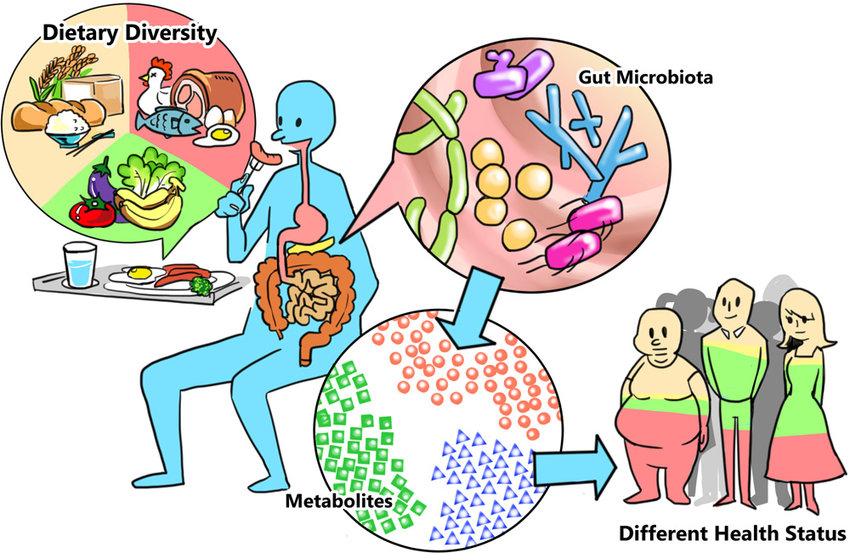
The gut microbiome-metabolomic-human health axis. Credit: ReserchGate.net
The “gut microbiome.” What does it mean?
Our ‘gut’ is defined as the gastrointestinal tract, starting in the mouth, continuing down the esophagus, into the stomach, the small and large intestine, and through to the anus. The entire human digestive system includes the ‘accessory organs of digestion’ including the tongue, the salivary glands, pancreas, liver, and gallbladder.
Our entire body is host to trillions of microorganisms including more than 1,000 different species of bacteria (the largest group) but also single-cell organisms called Achaea, as well as fungi, viruses and other microbes. Some are pathogenic but others are essential to health. They play a role in digestion and production of certain vitamins, and thus are instrumental in immunity, regeneration, DNA repair and protection, angiogenesis, and more. The Guardian reports how gut bacteria influence our health and risk for disease.
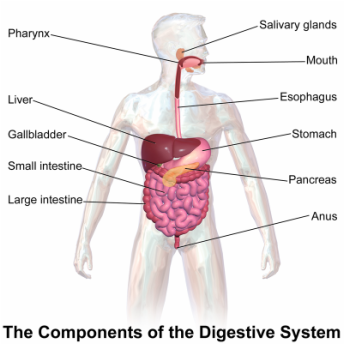 And as mentioned, a common side effect of a course of antibiotics is diarrhea. And it’s thought it’s because the antibiotics upset the balance of healthy and pathogenic bacteria in your gut.
And as mentioned, a common side effect of a course of antibiotics is diarrhea. And it’s thought it’s because the antibiotics upset the balance of healthy and pathogenic bacteria in your gut.
As reported in HuffPost.com, “When it comes to your gut health, it’s actually the balance of two types of bacteria — probiotics and prebiotics — that helps everything operating as it should.”
Homeostasis is the term that defines this delicate balancing act, and it can be maintained by eating a healthy diet. And that is because what you eat can influence and even change both the good and bad bacteria in your gut.
Prebiotics are plant fibers that, in your gut, are digested by bacteria and produce probiotics.
Think of prebiotics as the ‘food’ used to produce probiotic bacteria — you need both to have a healthy gut.
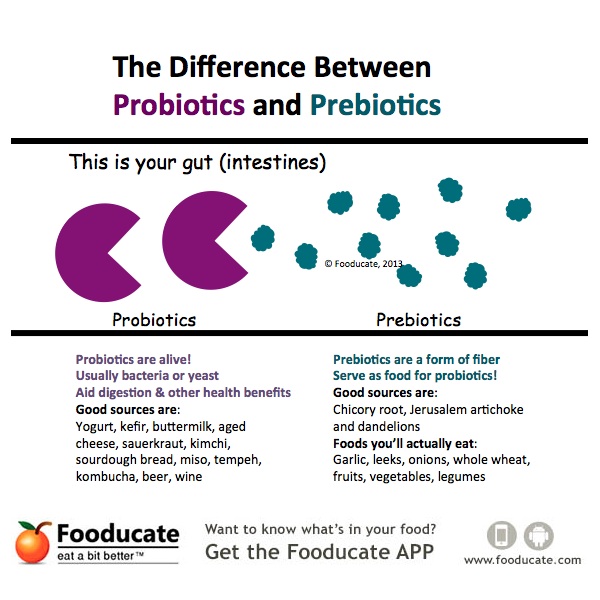
Prebiotics are found in certain plant foods including fruits and vegetables, legumes, and grains that contain complex carbohydrates — fiber and resistant starch — that passes through the digestive system and becomes “food” for bacteria and other microbes.
Probiotics help to keep gut bacteria balanced by limiting the growth of ‘bad’ bacteria. Many types of bacteria are classified as probiotics, the most common are Lactobacillus acidophilus is found in some yogurts and other fermented foods; and Bifidobacteria, found in some dairy products.
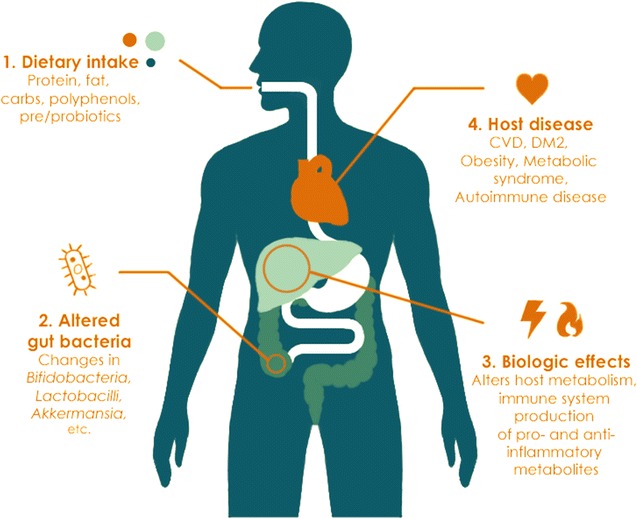
Impact of diet on gut
Examples of dairy products besides yogurt that contain probiotics include kefir; traditional buttermilk and aged cheeses; other fermented foods containing different strains of probiotics include kimchi; kombucha (a fermented tea); sauerkraut and some pickles; fermented soybeans like tempeh and miso; and water or brine-cured olives.
Probiotic supplements: A good idea?
And then there are supplements. I just searched the term “probiotic supplements” on Google which returned 58 million websites!
What if you had diarrhea from taking antibiotics? Should you take a probiotic supplement?
BBC/Future reported on the findings of a 2018 Israeli study that compared what happened when two different groups were given either a probiotic supplement (with 11 strains of probiotic bacteria) or a placebo for four weeks after a course of antibiotics. In the probiotic group, the microbiota remained “perturbed” for the entire six-month study period. But in the placebo group, the microbiota returned to normal within three weeks of finishing antibiotics.
“While it might sound like sense, there is scant solid evidence suggesting that probiotics actually work if taken this way. Researchers have found that taking probiotics after antibiotics in fact delays gut health recovery.”
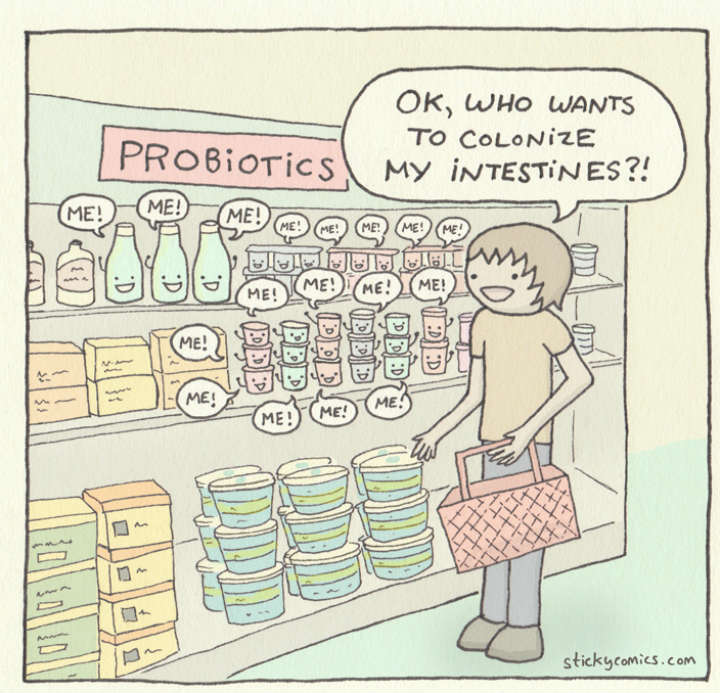
Other studies have addressed concerns that the human gut microbiome is so incredibly diverse and individualized that just taking a commercial probiotic supplement is like trying to fight a house fire with a garden hose — it could do little more than allowing the fire to spread.
The Takeaway — Eat Fiber and Fermented Foods
A study in the Journal of Translational Medicine reports that a Western diet (high in animal protein and fat, low in fiber) led to a significant decrease in total bacteria and beneficial bacteria, and production of cancer-producing nitrosamines.
CNN Health reports that the best and most practical strategy, on a consistent basis, and including when taking antibiotics (danielleofri.com), is to nurture your ‘good’ probiotic gut bacteria with their preferred prebiotic source of nutrition — fiber.
As reported by the Food & Drug Administration (FDA), unlike drugs, dietary supplements do not need approval for safety or effectiveness before they go to market. When safety issues arise, the FDA can investigate and take steps to remove a product, but to ban a compound in a dietary supplement requires lengthy scientific and legal actions. Read more from my column on dietary supplement safety here.
Probiotic supplements are not to be taken lightly. More is not better. Changes in the gut microbiota can result in bacteria producing more gas than usual and side effects of probiotic supplements could include gas, bloating, or diarrhea.
If you have an allergy to gluten, soy, eggs, dairy or lactose, be very careful: these are common ingredients in probiotic supplements.
Health experts have a specific warning about risk for infection in people who may have a weakened immune system such as those who may have just had surgery or are being treated for cancer, or an autoimmune disease — this goes for children too.
Because the probiotic supplements you’ll find on the pharmacy, health food, or even supermarket shelves are not guaranteed to contain what is written on the label (or even if they are live probiotic bacteria), it’s best to consume pre- and pro-biotics from food.
Click here for a list of prebiotic foods.
Click here for a list of probiotic foods
Learn more! Here is a five-minute video about the gut microbiome
https://youtu.be/YB-8JEo_0bI
Sources:
Amy Myers MD. 10 prebiotic foods to feed your good gut bacteria.
BBC/Future. Is it worth taking probiotics after antibiotics?
CNN Health/The Conversation. Does your gut need probiotics after antibiotics?
Food & Drug Administration. Dietary Supplements.
HuffPost.com. This is the difference between probiotics and prebiotics.
Journal of Translational Medicine. Influence of diet on the gut microbiome and implications for human health.
Mayo Clinic. Antibiotic-associated diarrhea
Medical News Today. Probiotic foods: what to know.
Monash University. Prebiotic diet – FAQs
The Guardian. The human microbiome: why our microbes could be key to our health.
__________________________________________
Susan Burke March, a Cuenca expat, is a Registered Dietitian and a Certified Diabetes Educator who specializes in smart solutions for weight loss and diabetes-related weight management.
The Cuenca Diabetes Support Group meets again on August 19th – join in!
Do you have a food, nutrition or health question? Write to Susan – SusanTheDietitian@gmail.com



















